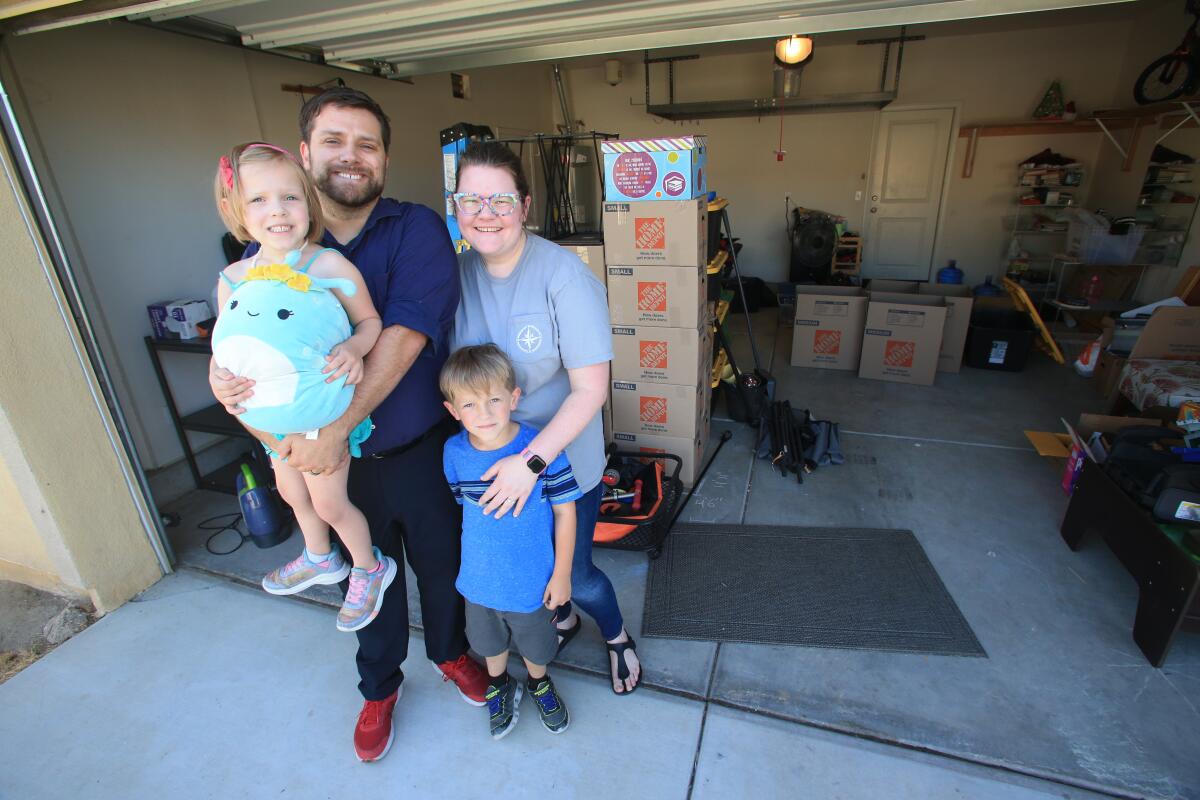They bought homes with the intention to refinance. Now they’re stuck

Steven and Katherine Wolf missed out on the ultra-low mortgage rates of the pandemic. By the time the couple secured solid jobs and could buy a home, borrowing costs more than doubled.
Rather than wait, the former renters jumped into homeownership in fall 2022. They also stretched, buying a Bakersfield home that carried an uncomfortable monthly payment.
Steven Wolf figured the pain would be fleeting. Within a year rates would drop enough to allow them to refinance and put hundreds of dollars back into their pockets.
That hasn’t happened and isn’t expected to soon. In fact, rates are higher.

“We did this with the expectation that we would only have to weather this high payment for a chunk of time,” the 37-year old English teacher said. “Now that chunk of time is looking like it might actually be permanent.”
Across the country, many buyers employed similar strategies after rates surged in 2022 — at times encouraged by real estate agents and mortgage brokers who earn a commission on each deal. The tactic could still work, but as interest rates stay higher for longer, some Americans express varying degrees of regret as their finances buckle.
A woman in Twinsburg, Ohio, said she’s taken a second job. A man in Oregon said putting money away for retirement is a “distant thought.”
Some said they’re now selling their home or will need to soon. Chelsea Bolinger purchased a house in Highland Ranch, Colo. The 35-year-old tech worker called the experience “horrible.”
“I only bought it because the loan company really pushed that interest rates were going to go down,” Bolinger said.
In Wolf’s case, he said his family’s monthly housing costs jumped nearly $1,500 when they ditched their second-floor apartment and bought a Bakersfield house for $421,000, in part because he and his wife wanted a yard for their two children.
Unable to knock down his monthly payment through refinancing, the family is making little progress paying off other debts and Wolf is working an extra period.
His wife, a speech language pathologist, has picked up weekend shifts she wouldn’t have if rates had dropped.
“That would have been more Saturdays together with the kids,” Wolf said.
Explore the latest prices for homes and rentals in and around Los Angeles.
In theory, the strategy Wolf and others employed is supposed to work like this.
Buy now — when rates are high and demand low — and you’ll more easily snag a home than if you waited until rates drop and reignite extreme bidding wars.
By acting now, a home’s purchase price will be lower. The monthly payment will be high, but that will go down once rates decline and you refinance.
As some say: Marry the house. Date the rate.

Personal finance, of course, is complicated.
When refinancing, you pay loan fees and other closing costs, which can exceed several thousands of dollars. Consumers must weigh those upfront costs against any savings on the monthly payment.
Holden Lewis, a mortgage expert with NerdWallet, said it typically makes financial sense to refinance once rates drop at least three quarters of a percentage point from where you bought.
According to the Mortgage Bankers Assn., the average rate on a 30-year fixed mortgage should drop to 5.9% by the fourth quarter of 2025, compared with 6.9% currently.
Buying now can be smart, but people should only do so if they are comfortable with the current payment, Lewis said. Expert predictions of falling rates have been proved wrong time and time again. Other home costs — such as HOA fees and insurance — tend to go up.
Even if rates fall, there’s no guarantee you’ll save. Your credit score could drop and lenders will charge you more.

Subscribers get exclusive access to this story
We’re offering L.A. Times subscribers special access to our best journalism. Thank you for your support.
Explore more Subscriber Exclusive content.
Amy Ramirez is among the many Americans who say they have no regrets.
She and her wife, Noelle, bought a home in Rancho Cucamonga in March. They can comfortably afford it and love the additional space compared with the property they sold in Los Angeles.
Ramirez isn’t expecting rates to drop soon and thinks buying when they did reduced the likelihood of bidding wars on their turnkey, four bedroom house with a swimming pool and mountain view.
“It is just great,” said Ramirez, who, along with Noelle, runs a s’mores shop in West Covina.
High mortgage rates aren’t only affecting consumers, but are also slamming many in the real estate industry as transactions decline.
Some lenders have responded with “Buy Now, Refinance Later” programs that offer reduced refinance fees if you take out a mortgage with the company to buy a home, then use them to refinance within a certain period of time.
Lewis said consumers should check whether the purchase mortgage in such a program carries higher fees or interest rates and also understand that when it comes time to refinance, other lenders may offer lower rates that would save far more than any reduction in fees from the original lender.

As of now, experts said there’s little sign that the inability to refinance will cause a bust similar to the collapse of the 2000s housing bubble.
Then, rising mortgage rates and falling home prices prevented many Americans from executing their plan to refinance out of risky loans before monthly payments adjusted upward from initial teaser rates. Stuck with those high payments, people entered foreclosure en masse, causing home prices to plunge.
Now, home prices are rising and struggling borrowers can probably sell to pay off their mortgage.
Even if prices were to fall, today’s tighter underwriting standards mean people should be better equipped to afford their mortgages than last time, while lenders offer struggling borrowers more options to adjust payments so they don’t lose their home.
“You are going to get very few foreclosures,” said Laurie Goodman, founder of the Housing Finance Policy Center at the Urban Institute think tank. “You are not going to get into that vicious cycle.”
In hindsight, Wolf said, he wished he had sought advice from someone without a financial stake in his home purchase, because he didn’t understand how to properly calculate the risk that his loan officer’s prediction — rates below 6% by summer 2023 — wouldn’t come true.
“I’m not a financial professional,” Wolf said. “I am an English teacher.”
A spokesperson with Wolf’s mortgage company, PrimeLending, said that the company could not comment on individual clients, but that it evaluates a borrower’s ability to repay based on current interest rates and that it “does not make guarantees” on how borrowing costs will change.
“The mortgage market is inherently unpredictable, and while we provide information based on current trends and expert analysis, these are not assurances,” the spokesperson, Mandy Jordan, said in an email.
Going forward, the Wolfs are looking to move to Baltimore after getting better job offers there.
Because their high monthly payment is more than what they could rent their house out for, they’ve listed it for sale and don’t expect to get their down payment back.
The other day, Wolf said he spoke with his loan officer who encouraged him to buy right away in Baltimore so they don’t get priced out and gave a new prediction for when rates would drop.
He also offered to do their loan, according to Wolf.
More to Read
Subscriber Exclusive Alert
If you're an L.A. Times subscriber, you can sign up to get alerts about early or entirely exclusive content.
You may occasionally receive promotional content from the Los Angeles Times.







